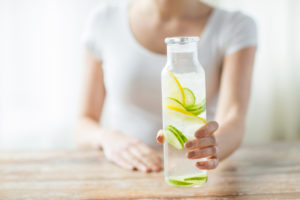WATER: The Master Metabolic Nutrient
By Jess Higgins Kelley, MNT, ONC
 In the field of oncology nutrition therapy, a lot of time is spent researching (and debating) about macronutrients: carbohydrates, protein, and fat. How much? What kind? In the past ten years we’ve also started hearing more about the mighty micronutrients: vitamins and minerals. Vitamin D, for example, is key for immune function. Potassium is just the ticket for leg cramps. But in the fifteen years I’ve been practicing, teaching, writing, and researching about nutrition, the foundational nutrient I always focus on first is water. Why? Because there are no other nutrients required in the amount or in the frequency that water is. You can only live for a few days without it. Conversely, we can live without carbohydrates forever, they are not essential. Meanwhile H2O is mandatory for millions of daily metabolic functions – it is the admiral nutrient of metabolic health. Health alert: most of us are not drinking enough of it.
In the field of oncology nutrition therapy, a lot of time is spent researching (and debating) about macronutrients: carbohydrates, protein, and fat. How much? What kind? In the past ten years we’ve also started hearing more about the mighty micronutrients: vitamins and minerals. Vitamin D, for example, is key for immune function. Potassium is just the ticket for leg cramps. But in the fifteen years I’ve been practicing, teaching, writing, and researching about nutrition, the foundational nutrient I always focus on first is water. Why? Because there are no other nutrients required in the amount or in the frequency that water is. You can only live for a few days without it. Conversely, we can live without carbohydrates forever, they are not essential. Meanwhile H2O is mandatory for millions of daily metabolic functions – it is the admiral nutrient of metabolic health. Health alert: most of us are not drinking enough of it.
“H2O is mandatory for millions of daily metabolic functions – it is the admiral nutrient of metabolic health. Health alert: most of us are not drinking enough of it.”
An estimated seventy-five percent of Americans are chronically dehydrated. Becoming dehydrated happens quickly. As little as a two-percent loss in hydration status can result in various impairments – and we lose an estimated half-ounce of water per hour just by breathing (respiration) during sleep! Early onset symptoms of dehydration appear within 48-hours and include: fatigue, cravings, headache, constipation, hunger, and cognitive impairment. According to a 2021 review paper in the journal Annals of Nutrition and Metabolism, titled, “A Journey through the Early Evidence Linking Hydration to Metabolic Health,” the long term effects of chronic dehydration can increase the risk of certain metabolic conditions including Type 2 diabetes, cardiovascular disease, cancer, and Alzheimer’s disease. The mechanism here is that dehydration reduces the function of mitochondria. Mitochondria produce the energy molecules we require to function by using the two hydrogen molecules found in water. Low water equals low energy which is why fatigue is so common in dehydration. What’s more, is that in a dehydrated state there is not enough water to transport mitochondria damaging and cancer-causing toxins away from the cell. The solution to pollution is dilution, I’ve always said.
Dehydrated?
How much water have you had today? The most common answer: not enough. This is one of the first questions every clinician should be asking their patients. Over the years, we have observed that the more chronically ill a person is, the more dehydrated they are. The good news is that getting properly hydrated is the most simple, cost effective, and potent metabolic nutrition intervention you can do. And you can start right now. The benefits of becoming properly hydrated are felt fairly soon, from improved mental clarity, improved digestion, increased energy, and weight loss. Yes, simply drinking more water can help you lose weight. In fact, one study that appeared in the Journal of Clinical Endocrinology & Metabolism found that drinking 500 ml of water increased metabolic rate by 30-percent within ten minutes.
Past guidelines issued by the National Academies of Science and Medicine stated that sedentary adult females require around 90-ounces of water a day and adult males require around 125-ounces in order to be properly hydrated. That’s a lot of water. Hydration requirements also increase with exercise, vomiting, or diarrhea. So, the first intervention strategy to employ here is this: get a special ceramic cup, glass, or bottle. A water bottle that you enjoy looking at, know how much water it holds, and motivates you to bring it around with you. Your water receptacle now becomes a compulsory daily companion, like a purse or small dog. It is not disposable – plastic water bottles contain harmful, endocrine disrupting chemicals. Get glass or stainless steel. Then… drink water… all day long. At home, I personally use a 30-ounce, wide-mouth, Ball glass jar and know to fill it four times a day.
Sidebar Tip: After your body adjusts to more water intake the frequency of urination will decrease. For nighttime urination issues, stop drinking water after sunset. When your body metabolically adapts to the increased amounts of water and electrolytes (sodium, potassium, magnesium, etc.) urination frequency typically will normalize so don’t let increased urination stop you from drinking more water!
“Eighty-six percent of the U.S. population relies on a public utility company to provide, test, and maintain their water supply.”
Once we get enough water coming into the system, the second question practitioners need to be asking their patient population is: “What is your water source?” The majority of people on earth get their water from public drinking (tap) water, well water, or bottled water. Eighty-six percent of the U.S. population relies on a public utility company to provide, test, and maintain their water supply. The other fourteen percent of Americans have a private well. Further, estimates now are that one in five people are getting their water from within a bottle or can.
The modern seltzer water movement has worked wonders for those looking to decrease the amount of sugary sodas they drink, but still crave that fizz. The general census is that carbonated waters are equally as hydrating as flat water. However, the (often) inexpensive options can come with added metabolic mutilators like natural and artificial flavors, zero calorie sweeteners, and other synthetic ingredients. The quality of the seltzer water matters if you are going to drink canned or bottled water as your primary hydration source. Some brands that we are currently testing and enjoying at the Oncology Nutrition Institute are Ghia, Dram, and Sanzo (no affiliate relationships). Of course the plain, sparkling mineral waters in glass bottles offered by companies like S.Pellegrino are going to be the best choice. One step further, various types of specialized water including deuterium depleted, structured, and hydrogen waters are all gaining momentum as polypotent nutrition interventions, and if you are a bottled water drinker, considering looking into these.
If you are a tap water drinker, the quality of the water coming out of your tap depends on where you live. Several years ago, the Environmental Working Group (EWG) put out a comprehensive database where you enter your zip code and get water quality reporting provided by your local public water utility company (https://www.ewg.org/tapwater/). No matter what, public drinking water systems are required to treat with chlorine and fluoride, now both linked to long term endocrine and neurological effects. Thus, getting either a counter top filter (EWG recommends the Epic counter top water filter) or a whole house reverse osmosis system is one of the best investments in your health you can make.
For well water drinkers, it’s worth testing your well if you have not done so in the last five years. Most public water utility companies offer home test kits at a low price, and it can become an entertaining educational project to do at home, especially with kids or grandkids. If you live in an agricultural area there is high potential for your well water to be contaminated with cancer causing pesticides or heavy metals. Good news, there are water filter companies that can filter out some of these toxic chemicals including Berkey and Clearly Filtered. A Hollywood movie based on a true-story, titled Erin Brockovich, might help illuminate the link behind water contamination and cancer.
Everyone can benefit from tuning into their hydration status and the quality of water they drink. From increased energy, to weight loss, clearer mind and skin, and improved mitochondrial function, water has always been and will remain the master metabolic nutrient. Start making drinking lots of water a pleasant habit. If you make it the only health goal you focus on this year you will be making a massive positive impact on your metabolic health. Find your favorite cup. Start learning about your water sources, read labels, and test your well water. Avoid plastic at all costs. If you have been chronically dehydrated, or are undergoing any type of cancer treatment, after three months of drinking around 100 ounces of clean water a day, you might just be amazed at how different you feel. Bottoms up!
ABOUT THE AUTHOR
Jess Higgins Kelley, MNT, ONC, and Founder of the Oncology Nutrition Institute, is an acclaimed journalist, nutrition therapist, and public health educator, celebrated for co-authoring the best-selling book “The Metabolic Approach to Cancer,” which highlights the integration of deep nutrition, the ketogenic diet, and non-toxic therapies in metabolic oncology nutrition, and is available globally. With a journalism degree from Western Colorado University and a Master Nutrition Therapist degree from the Nutrition Therapy Institute in Denver, she has won significant awards, including the Alaska Press Club Award in 2000. Jess has contributed to various publications and has extensive experience in nutrition, specializing in oncology. She founded the Oncology Nutrition Institute, leading a certification program for nutrition and medical professionals. Additionally, Jess is a licensed sea captain and an enthusiast in trail running and organic gardening, showcasing her diverse talents and commitments beyond her professional achievements.






